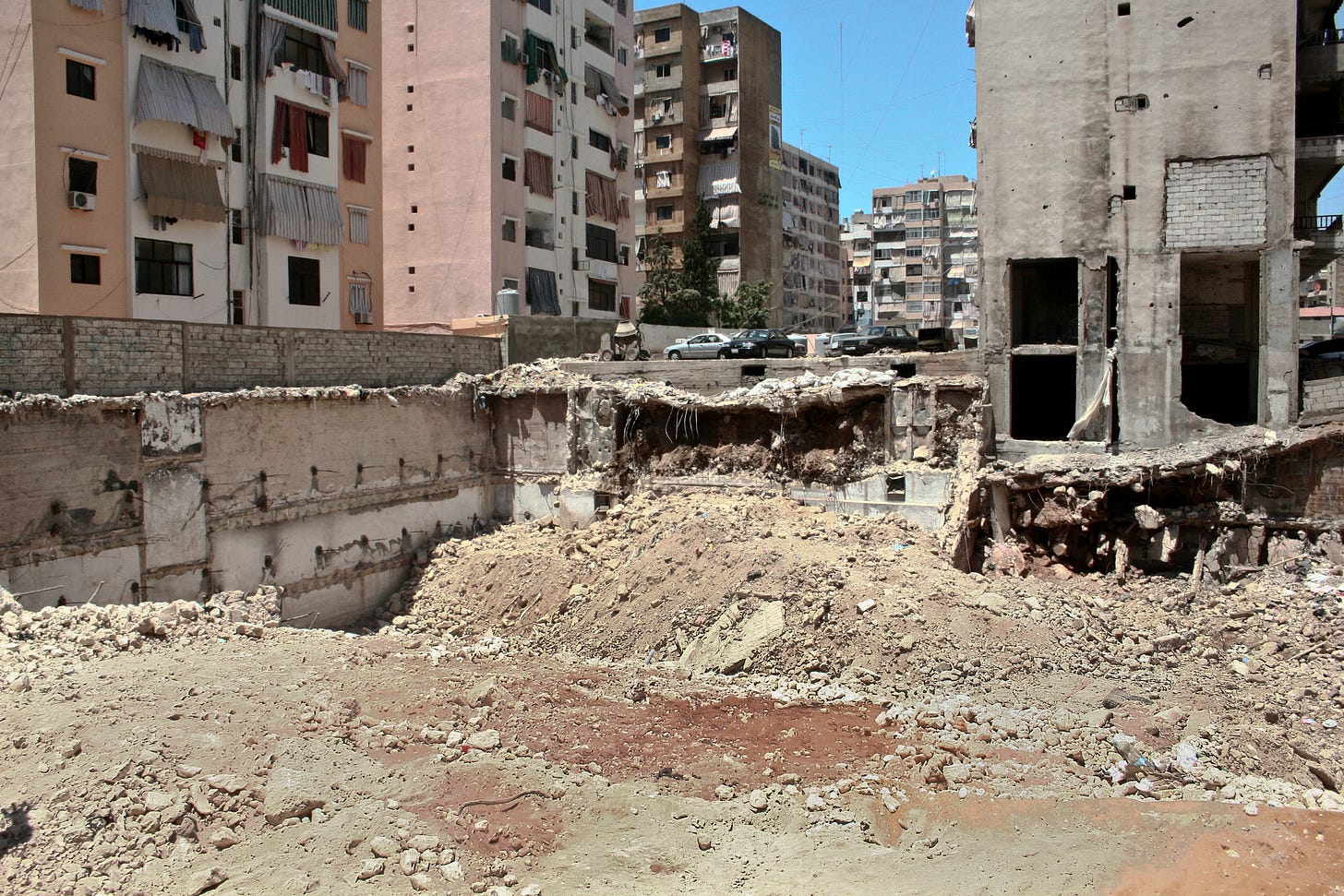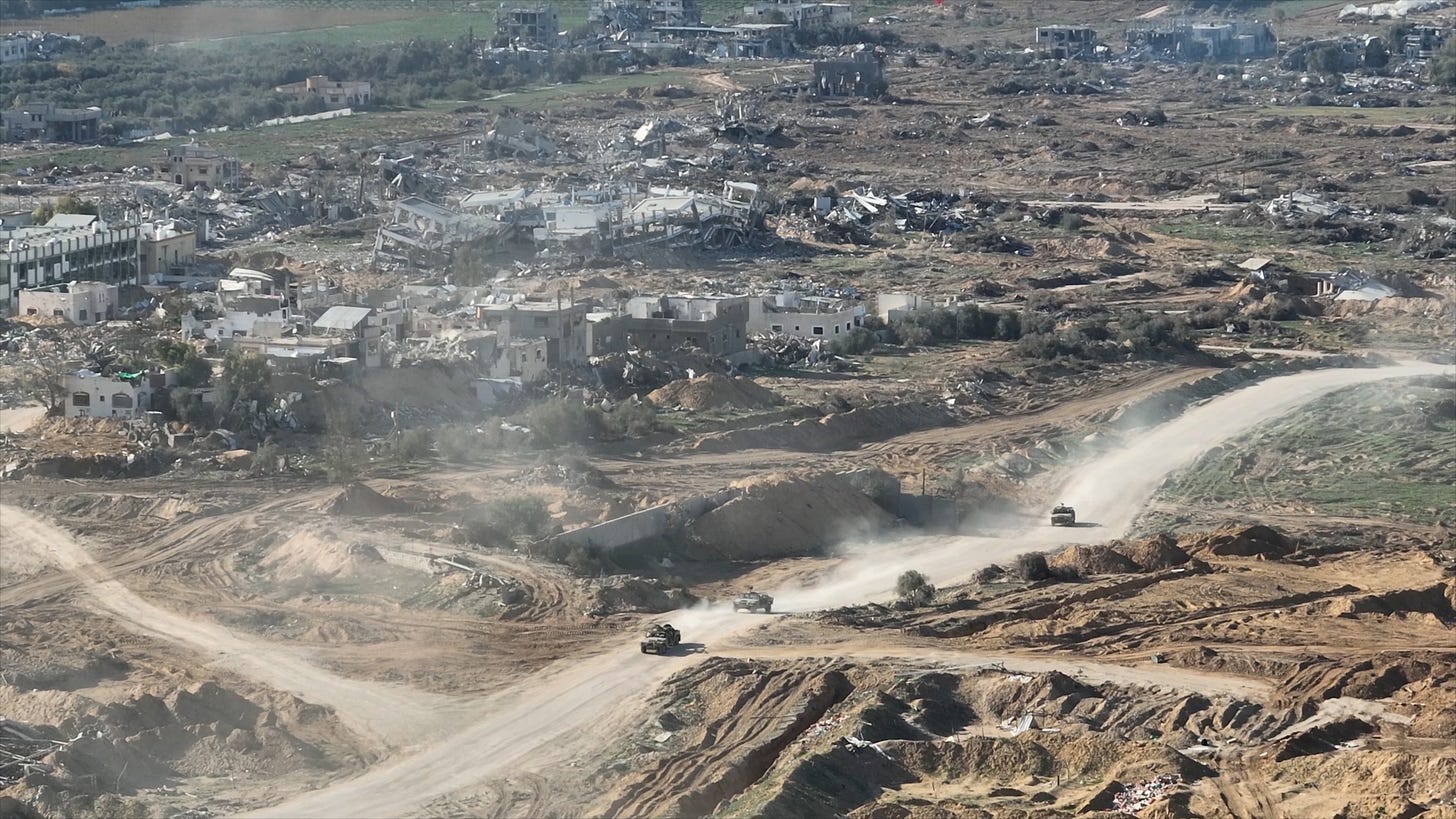One Year, Nine Fronts: Israel’s Expanding War of Conquest
Over the past year, Israel has transformed its Genocidal campaign on Gaza into a campaign that spans the entire region of the Middle East. What began as relentless bombardment and occupation has escalated into a series of cross-border strikes, assassinations, and maritime attacks that have dragged at least nine countries into Israel’s line of fire. With the bombing of Doha, Qatar, the pattern is undeniable. This is regional war of aggression that threatens to redraw the map of the Middle East in Israel’s image, and is shredding international law in the process.
Palestine: Gaza and the West Bank
The beating heart of Israel’s aggression remains Palestine itself. In Gaza, whole neighborhoods have been wiped out under the guise of military necessity. Apartment blocks flattened, hospitals and schools bombed, refugee camps targeted. What was once described as a military occupation has become a state of complete Genocide against a captive population. Civilians have borne the brunt of the aggression, with a death toll showing tens of thousands of deaths, and we know that death toll is drastically undercounted.
The West Bank has mostly escaped the headlines, but has no escaped Israel’s aggression. Daily raids by Israeli forces have turned towns and villages into warzones. Curfews and checkpoints have strangled life, while settler violence escalates with impunity. Armed incursions are presented as counterterrorism, but they clearly meet the definition of collective punishment, as do the mass imprisonments seen in recent months, a video below shows one of these mass arrests, when Palestinian men were rounded up and arrested.
This internal core of the campaign is crucial to understand. Without it, the regional expansion appears unmoored. But Gaza and the West Bank are the permanent laboratories of Israeli force, the place where methods are honed before they are exported to neighboring states.
Lebanon
Lebanon has long been in Israel’s sights, as evidenced by an Israeli propaganda book for children, and the past year has seen a steady increase in strikes. The south has been hammered with artillery and airstrikes, despite the ceasefire that has been signed between the two countries. Lebanese civilians continue to pay the price, while their government calls for Israel to finally respect the ceasefire.

Each strike in Lebanon pushes the country closer to a wider war. While international media focuses on Gaza, Israel has kept Lebanon under constant pressure, testing the limits of retaliation and daring Hezbollah to escalate.The danger is immense. Lebanon is fragile, politically fractured and economically devastated. Israel’s strikes risk tipping the balance entirely, dragging yet another population into the fire.
Syria
Syria has been a battlefield for Israel’s jets for years, but the frequency and scale of strikes in 2025 marked a new chapter. From Homs to Latakia to Palmyra, Israel has conducted relentless bombardment of Syrian military sites, claiming to target Iranian forces and Hezbollah supply lines. In truth, Syrian sovereignty has become a fiction. While Turkey also has a role to play in the current escalation seen in Syria, Israel’s military has taken territory beyond territorial agreements with Syria, and has attacked government buildings and troops.
What is striking about the Syria front is its normalization. These are not extraordinary acts of war but routine operations. Each strike erodes the principle of sovereignty a little further, teaching the world that Israel can bomb another nation with impunity. The world shrugs, and the precedent solidifies. Syria is the silent front of Israel’s war, ignored yet constant.
Iran
The most dangerous escalation came with the June 2025 strikes inside Iran. Israel, with the help of the USA, crossed a threshold many assumed it would avoid, direct attacks on Iranian soil. These followed the assassination of Hamas leader Ismail Haniyeh in Tehran in 2024, an act that shocked the region. But the June strikes marked something different.
Trump’s Iran Strike Violated the Constitution. Full Stop.
It doesn’t matter how many talking heads on cable news spin this. It doesn’t matter how many senators release mealy-mouthed statements about "concern." What happened was simple: the sitting president of the United States bombed a foreign nation without congressional approval,
Iran is not Gaza, nor is it Syria. It is a major regional power, by striking inside Iran, Israel risked a spiral that could engulf the entire Middle East in flames. The strikes were presented as pre-emptive self-defense, but international law offers no such license for preventive aggression. Israel acted as judge, jury, and executioner, deciding unilaterally that it could bomb another sovereign nation at will.
The Iran strikes revealed the sheer audacity of Israel’s military doctrine. No border is sacred and no state untouchable. The precedent is terrifying: if Israel can strike Iran without consequence, then every state in the region is at risk, as proved by the attack on Qatar that we will soon get to.
Qatar
The September 2025 strike on Doha was different. Qatar is a host to US bases and diplomatic missions, and a nation central to negotiations with Hamas. At least ten bombs dropped in the heart of Qatar as Hamas negotiators discussed a US ceasefire proposal.
The strike on Doha was a watershed moment. It revealed Israel’s willingness to strike anywhere, even in the capital of a state allied to Washington. It also destroyed the last viable channel for peace with Hamas. The message to the world was that negotiations themselves are now Israeli targets and Israel would rather bomb the negotiators than talk to them.
Qatar’s sovereignty was obliterated in a single night. The symbolism is staggering. If Israel can bomb Doha, then no city in the region is safe.
Yemen
If Iran was audacious, Yemen was ruthless. Thousands of kilometers from Israel’s borders, Yemen has been drawn into the conflict through long-range air and naval strikes. Israel claimed retaliation against Houthi attacks on Red Sea shipping, but the scale went far beyond deterrence. Ports were bombed, the capital Sanaa struck, and the Houthi Prime Minister Ahmed al-Rahawi assassinated.
Yemen’s devastation is already catastrophic from years of war and blockade. Israel’s interventions deepened that suffering. Civilians were caught between local conflict and distant aggression, paying the price for being within range of Israeli weapons. The strikes on Yemen demonstrated Israel’s growing ability and willingness to project power across vast distances. They also showed a willingness to treat yet another nation’s capital as expendable in its campaign.
Tunisia
In September 2025, Tunisia was pulled into the conflict when the Freedom Flotilla reported its lead vessel struck while docked at Sidi Bou Saïd. Grainy CCTV captured flames erupting on deck, activists fleeing in panic.
While Tunisian authorities insisted the blaze began onboard, activists and witnesses claimed a drone strike. Whether by drone or fire, the symbolism was powerful. Tunisia had become part of the battlefield. Its coastline, long distant from the front lines of Gaza, was suddenly linked to Israel’s campaign against civil society efforts to break the blockade. For many, it was proof that the war had reached into North Africa, showing that Israel’s aggression is not limited to the Levant but now touches the Maghreb as well.
Iraq
Often overshadowed by strikes on Syria and Lebanon, Iraq has also been subjected to Israeli bombardment over the past year. Militias aligned with Iran and operating near the Syrian border were repeatedly hit by Israeli jets and drones.
These operations were justified by Israel as pre-emptive moves against Iranian entrenchment, but to Iraqis they were a violation of sovereignty, no different from the strikes in Damascus or Beirut. Iraq has endured decades of foreign intervention, and Israel’s strikes have become one more chapter in that long erosion of independence. Though often overlooked, the Iraqi front reveals the scale of Israel’s reach: no state tethered to Iran escapes its firepower.
A Regional War of Aggression
In one year, Israel has struck Gaza, the West Bank, Lebanon, Syria, Iran, Yemen, Iraq, Tunisia, and now Qatar. Nine fronts, thousands of acts of aggression, each carried out in open defiance of international law. The doctrine of sovereignty, the UN Charter, the very idea of borders have been shredded.
This is expansion. Israel’s campaign is no longer limited to wiping out Gaza but to projecting military power across the region, unchecked and unpunished. The United States and the United Kingdom have played enabling roles, whether by giving green lights, offering airspace, or placing surveillance planes overhead. Their complicity makes them co-authors of this expanding war.
The silence of the international community is deafening. Condemnations are issued, but consequences never follow. Each new strike reinforces the lesson that Israel can bomb another country, kill its citizens, and face no punishment for their actions.
The strike on Qatar, however, may shift the ground. Arab states, including Saudi Arabia, have signaled fury, a fury that has resulted in an emergency meeting of Arab and Islamic leaders. The violation of Qatar’s sovereignty, so blatant and so reckless, cannot be ignored.
The Greater Israel Question
The breadth of Israel’s campaign raises an unavoidable question: is this about security, or is it about expansion?
The rhetoric of self-defense collapses under the weight of nine fronts in twelve months. No nation facing genuine existential threat conducts such a broad and offensive war and what emerges instead is the outline of a doctrine of expansion.
Ethnic Cleansing, the Search for Greater Israel
The phrase “Greater Israel” evokes different reactions depending on who hears it. To many on the Israeli far-right, it’s a vision of biblical redemption—a modern state reasserting ancient borders, one settlement at a time. To Palestinians, it’s the slow erasure of their homeland
Some frame this as the pursuit of a Greater Israel project, the ideological ambition of territorial and regional domination. This is an ideology that the Israeli Prime Minister has recently signalled a sympathy to.
One year, nine fronts, countless violations. Israel has crossed every border and broken every law. It has bombed refugee camps and capitals, ports and flotillas, villages and negotiating tables, while each act was justified in the language of security, but together they tell the story of conquest.
The world now faces a choice. Continue to condemn with words while doing nothing, or recognize that Israel’s war is not defensive but aggressive, not isolated but regional, not temporary but permanent. To accept this war without action is to accept the death of international law itself.
Israel’s strike on Qatar has made the reality undeniable. This is not about Gaza anymore, if it ever was. It is about power, domination, and a region under siege. The war has expanded, and it shows no sign of ending. At this pace, the next front is only a matter of time.









